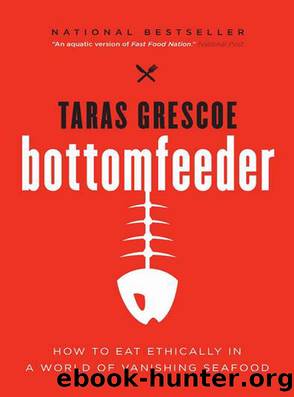Bottomfeeder by Taras Grescoe

Author:Taras Grescoe [Taras Grescoe ]
Language: eng
Format: epub
ISBN: 9781443400169
Publisher: HarperCollins Canada
Delenda est India
It is clear who pays the highest price for shrimp farming: those unfortunate enough to live in coastal regions suitable for aquaculture. But who, apart from retailers and restaurant chains, is profiting from the blue revolution?
In Tamil Nadu, it is rarely the individual farmer, who has to cope with low prices and high feed costs, and, sooner or later, will almost certainly see his investment wiped out by disease. Nor is the blue revolution benefiting some new rural workforce. In spite of the much vaunted burgeoning of the Indian middle class—the nation now boasts one-third of the world’s software engineers—it still remains home to a quarter of the world’s undernourished. What India is rich in is manpower, and the nation’s great challenge is feeding a population of over a billion, two thirds of whom are still employed in agriculture. An acre of rice paddy provides employment for fourteen people; at best, an acre of shrimp ponds employs one person. On the afternoon I visited the shrimp farm near Vailankanni, I saw a single worker—a sixteen-year-old boy—supervising four ponds. Though more workers would be employed during the brief harvesting period, the farms hardly provide steady work.
The owners of the processing plants in Chennai and Pondicherry are only slightly better off. They rely on a workforce of young women, mostly from the neighboring state of Kerala, who are willing to work twelve-hour days, and on festival days, because they send money back to their families. A big plant might employ fifteen hundred women, who sleep in hostels on the site and spend their days beheading and deveining the shrimp. The average monthly wage for women, I had learned, was 1,590 rupees ($35), at least a third less then men doing similar work. Even while paying such slave wages, the exporters, facing tariffs and competition from China, are going through troubled times. There were once sixty in the state; now there are only fifteen.
The one Asian company that is profiting from the shrimp boom is the Charoen Pokphand Group, whose feed bags I had seen at the shrimp farm near Vailankanni. The CP Group is a Thai multinational that, among other things, owns the 7-Eleven franchise in Thailand, supplies chicken to KFCs throughout China, farms tilapia in the military dictatorship of Burma, and has introduced American-style battery chicken farming to Asia. Founded as a feedstuffs business by four sons born to Chinese immigrants in Thailand, CP was taken over by the youngest, Dhanin Chearavanont, who elbowed out his older brothers and built CP into the Cargill of Asia. The CP Group is now a stable of 250 companies with a hundred thousand employees in twenty countries, and it is one of the world’s top five animal feed producers. It has utterly transformed the landscape of Thailand—a Senate committee found that the company had encroached on mangrove forests in Rayong Province—making shrimp ponds ubiquitous in that country.
Shrimp farms are far too susceptible to disease to make their ownership profitable. It makes more
Download
This site does not store any files on its server. We only index and link to content provided by other sites. Please contact the content providers to delete copyright contents if any and email us, we'll remove relevant links or contents immediately.
| Africa | Americas |
| Arctic & Antarctica | Asia |
| Australia & Oceania | Europe |
| Middle East | Russia |
| United States | World |
| Ancient Civilizations | Military |
| Historical Study & Educational Resources |
The Third Pole by Mark Synnott(952)
Money for Nothing by Thomas Levenson(948)
The Economist (20210109) by calibre(937)
Christian Ethics by Wilkens Steve;(860)
Made in China by Anna Qu(855)
The Age of Louis XIV: The Story of Civilization by Will Durant(833)
Nonstate Warfare by Stephen Biddle(815)
Reopening Muslim Minds by Mustafa Akyol(813)
100 Posters That Changed The World by Salter Colin T.;(786)
The Shortest History of China by Linda Jaivin(779)
Culture by Terry Eagleton(776)
The Great Pyramid Void Enigma by Scott Creighton(761)
The Irish Buddhist by Alicia Turner(760)
Ideology by Eagleton Terry;(743)
Routledge Handbook of Contemporary India by Knut A. Jacobsen(742)
Sybille Bedford by Selina Hastings(689)
The Jews of Silence: A Personal Report on Soviet Jewry by Elie Wiesel(687)
Banaras: CITY OF LIGHT by Diana L. Eck(680)
Objects of Vision by Saab A. Joan;(670)
